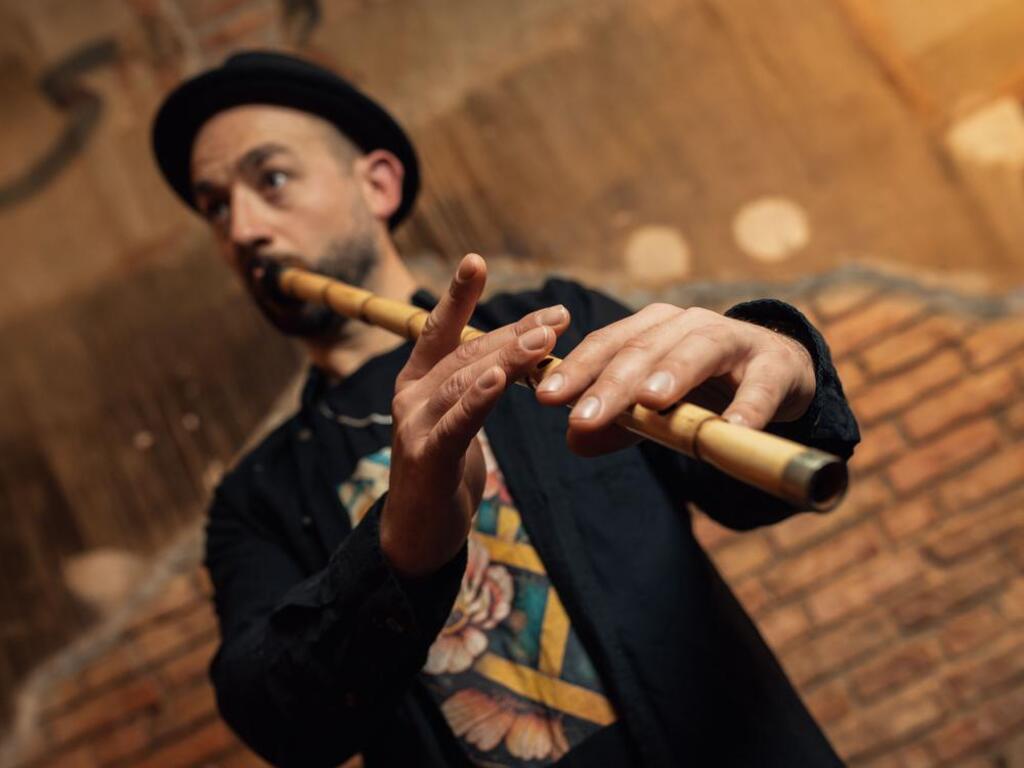Tayfun Guttstadt infuses his Hamburg origins with the rich textures of Turkish music, creating a unique blend of tradition and innovation.
DAILY SABAH, 13 SEPTEMBER 2024
began our conversation with Tayfun Guttstadt by asking him to introduce himself and share some insights into his musical journey. Tayfun, born in Hamburg in 1987 to a Turkish father from Konya and a German mother, described his early environment as not particularly musical, despite his parents’ interest in Eastern culture. “My mother encouraged me to start playing the electric guitar when I was 13,” he recalled. “I quickly fell in love with music and often played even before school started.”
As we explored his formative years, Tayfun remembered spending part of his childhood in Mersin, Türkiye. “During that time, I was exposed to Turkish folk and Anatolian music through shows like İbo Show,” he noted. “This exposure had a significant impact on me.” When asked how this influenced his musical path, he explained that as he grew older, his connection to Türkiye diminished and he spent a year in Guatemala through a student exchange program. “There, I shifted from electric to classical guitar and developed a deep appreciation for Latin American music,” Tayfun said.
Upon returning to Hamburg, I asked Tayfun about exploring his Turkish roots. He revealed that his father’s passing prompted him to delve deeper into Anatolian music. “My uncles supported my growing passion by giving me a bağlama and Turkish music CDs,” he recalled. The bağlama is a traditional Turkish string instrument with a rich, resonant sound, often used in folk music. “This was when my profound engagement with Turkish music really began.”
Curious about his fascination with the ney, I inquired how he developed an interest in this traditional Sufi instrument. “My interest in the ney began with Turkish classical music and Sufi sounds, thanks to albums by artists like Aziz Şenol Filiz and Mercan Dede,” he said. The ney is a traditional Middle Eastern flute known for its soulful, airy tones and its significant role in Sufi music. “I was also drawn to Sufism and Middle Eastern culture.” Tayfun described his journey to Türkiye, where he purchased a ney from Galip Dede and traveled to Iran to learn Persian. “I spent a year in Türkiye studying the ney with Fakih Kademoğlu and immersed myself in Turkish classical music and poetry,” he explained. “This period was crucial for my musical development.”
When discussing his unique musical style, Tayfun described his main instruments as the guitar and ney, though he also plays other string instruments. “Blending traditional Turkish music with hip-hop and trap happened naturally for me,” he said. “Growing up in Hamburg, a hub for German hip-hop, I was naturally inclined toward the genre. My love for Middle Eastern music influenced my sound, leading me to mix hip-hop beats with traditional melodies.” He added that this fusion was an organic development culminating in his solo album during the pandemic.
I also inquired about his collaborations with musicians from various countries. Tayfun mentioned working with artists from Türkiye, Germany, Iran, Greece, Israel, Syria and Palestine, including Özlem Taner, Dilek Türkan and Mahan Mirarab. “Each collaboration enriched my understanding of different musical traditions,” he said. “It reinforced my belief in the deep-rooted connections among Middle Eastern cultures.”
Comparing the music scenes in Germany and Türkiye, Tayfun observed that Türkiye’s vibrant live music scene offers many opportunities but can sometimes affect the quality and respect for musicians. “In Berlin, the organizational support for concerts is better, thanks to substantial funding,” he said. “While Türkiye has a strong listener base for my music, I plan to perform there more frequently in the future.”
Tayfun shared that his music has received positive feedback in Germany, and he has performed in various European countries, including the Netherlands. “Although I’ve performed in Türkiye before, it wasn’t with my own album,” he said. “I look forward to more opportunities there.”
Looking ahead, Tayfun wanted to collaborate with artists from different Middle Eastern languages and delve deeper into music production. “I also want to work with prominent Turkish rap and folk musicians,” he said. “My concerts always feature master musicians, offering unique performances each time.” Despite his love for Türkiye, Tayfun plans to stay in Germany for a few more years due to his established work life and family commitments.
Finally, when asked about his influences, Tayfun mentioned artists such as Mercan Dede, Erkan Oğur and Laço Tayfa, as well as contemporary figures like Ezhel and Khontkar. “I also admire Ahiyan’s recent work and would love to collaborate with him,” he said. For Tayfun, music is a profound exploration of harmony and a means to uncover the universe’s mysteries. “Music offers a unique form of joy and fulfillment,” he concluded.

